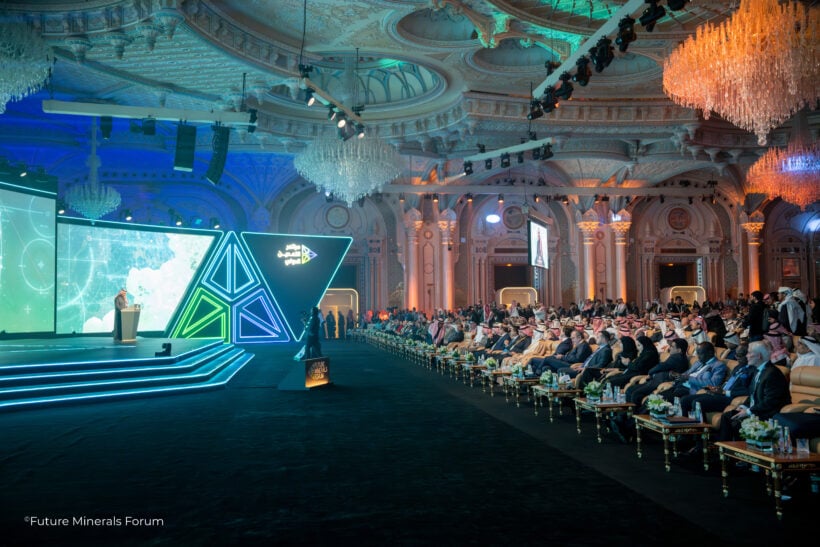
The global demand for minerals is surging, fuelled by the transition to clean energy and the rise of advanced technologies.
The Future Minerals Forum (FMF), held in Riyadh, Saudi Arabia, has become the epicenter for shaping global mineral strategies. Its latest report, “Shaping the Future of Minerals”, sheds light on the challenges and opportunities facing the sector.
The report, developed with contributions from Wood Mackenzie, CRU, Clareo, GlobalAI and the Baker Institute, reveals an urgent reality: the world needs $5.4 trillion in mineral investment by 2035 to sustain and expand mining and processing capacity. This figure is a call to rethink global minerals supply.
Minerals are essential for global development and the transition to electrification. But the report highlights a daunting challenge: mineral demand for renewable energy and manufacture of electric goods, and powering the AI revolution is outpacing the supply chain’s ability to deliver these materials. For instance, lithium processing alone is projected to grow fifteenfold by 2040, but infrastructure and resource depletion threaten supply stability.
Patrick Barnes, Global Head of Metals and Mining Consulting at Wood Mackenzie, highlighted the sector’s challenges, “The effort to de-risk supply chains and, in parallel, accelerate the energy transition represents an opportunity for a lot of investment – not just in mines but in the midstream and downstream of these minerals. Emerging markets, particularly in Asia-Pacific, Latin America, and Sub-Saharan Africa, are poised to capture over 40% of global mineral capital investment, a dramatic shift in capital flows and geopolitical priorities.”
Despite challenges, there is significant economic potential for countries investing in mineral value addition. Nations like Indonesia have successfully transitioned from raw mineral exporters to leading players in processed commodities like nickel. This transformation is a blueprint for other resource-rich regions.
The report also challenges traditional extractive practices, urging a shift towards shared value creation. Historically, mining has been criticized for its “extract-and-ship” or “pit-to-port” mindset, which often sidelines local economic development. But as resource nationalism grows and societal expectations shift, mining companies face increasing pressure to balance profits with community benefits. “The focus on critical minerals has opened up the debate of role of mining in society more generally. It’s focus is now on how we make mines can contribute to development more broadly,” explained Mark Cutifani, Chairman at Vale Base Metals. “We need local communities to see us as partners, and we want them to benefit from the development of mines. it’s not a matter of engagement; it’s involvement.”
This sentiment is echoed across the sector, with shared value creation emerging as a cornerstone for sustainable development. Aldo Pennini, FMF Director for Strategy and Content adds, “The Future Minerals Forum brings countries together at a time when the world is fragmenting, putting forward practical actions for minerals to make a bigger contribution to host communities, national economies, and global development.”
Governments and companies must collaborate to create frameworks that ensure shared prosperity. Peter Bryant, Board Chair of Clareo, stressed: “Government plays a key role in creating shared value by providing the springboards to investment and not being overly prescriptive.”
The report outlines strategies for achieving this:
- Targeted investment: Policymakers should prioritize projects that align with national competitiveness and market dynamics. For example, Indonesia’s ban on raw nickel exports led to a thriving domestic processing industry.
- Public-Private Partnerships: Collaborative models like Anglo American’s regional development initiatives highlight the potential for multi-sectoral impact.
- ESG-driven approaches: From water recycling to community engagement, sustainable practices are essential to addressing the growing scrutiny of the mining sector.
Ali Al-Mutairi, FMF’s Executive Director, emphasises the importance of action: “The minerals industry is at a turning point. Companies are taking on the responsibility of fostering shared value through deeper stakeholder collaboration.”
The Future Minerals Forum plays a crucial role in shifting perceptions about the mining industry. The energy transition will depend heavily on minerals, and unlocking the required funds demands collaboration and a shared vision.
This transformative era of minerals offers challenges and immense opportunities to reshape the global mineral landscape for the better. The question now is whether stakeholders will seize the moment to ensure that mineral wealth truly benefits all.

